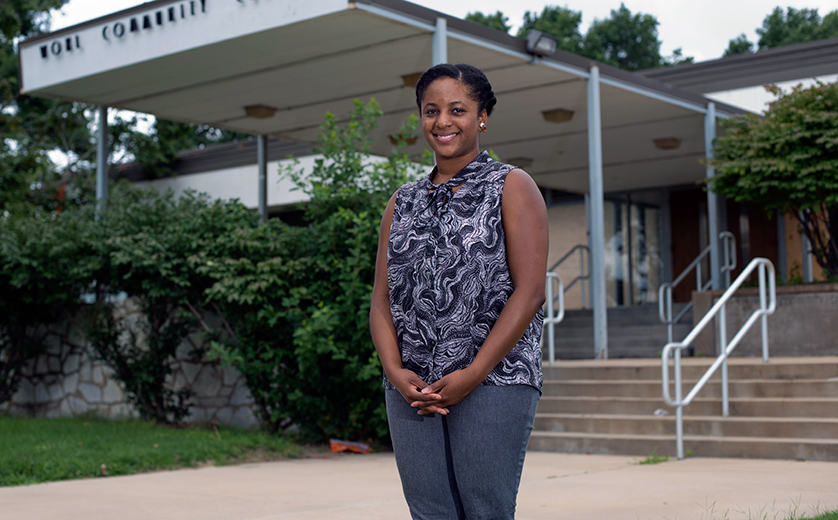A second-year MPH student specializing in Epidemiology/Biostatistics, Donnatesa Dean has become passionate about school-based health centers, a healthcare model that offers on-site health services to students and has been shown to improve the health and academic outcomes of disadvantaged youth.
She has worked alongside Jason Purnell, an associate professor at the Brown School, to conduct an evaluation of one such clinic, the first of its kind in St. Louis. As the work progressed, she presented her findings at the American Public Health Association annual meeting. She sat down to tell us more about her research experiences, her work with the For the Sake of All initiative, and the perspective she’s gained along the way.
Could you give us an overview of the work you’ve been doing?
My main project has been working on the evaluation of a school-based health center at Roosevelt High School in St. Louis, which is operated by the Mercy health system. I served as the liaison between the health center and the research team.
I’ve helped develop focus groups and interview protocols, conducted focus groups with students and interviews with other stakeholders, and contributed to the analysis and report development. The report is complete and we’re now working with stakeholders to present findings.
What has surprised you about the evaluation process?
Implementing a comprehensive evaluation plan can often be met with real-world challenges that require adjustments to the process. For example, we had to think of creative ways to recruit our student sample and to work with our center staff and school team to see what new strategies were feasible.
With this type of work, it’s important that stakeholders are engaged in the process — the health center staff, the hospital system, school staff, the school district, and the research team all have to remain connected and invested to successfully evaluate such a program.
I was also surprised to see so few school-based health centers in this region, given that they are an evidenced-based, nationally recognized model of care; there are over 2,300 school-based health centers across the U.S.
When the Roosevelt High School health clinic was established in 2012, there wasn’t a local model to look to for guidance. Even today, there are only two school-based health centers in operation in the St. Louis region. As a region, we are just now realizing the critical role such centers can play in helping to improve access to healthcare and to reduce health and education disparities for our students.
How has this research experience benefitted you?
I appreciated the multifaceted nature of the project. There were several components that had to come together to conduct this evaluation, and I was able to contribute in various ways these different areas. I also love working with people in the community and being able to see how this work could have a direct impact on clinical practices and what’s happening on the ground.
I’ve really enjoyed working with Dr. Purnell and our evaluation team. Dr. Purnell is a phenomenal leader. He gave me ample room to learn and expand my skills on this project; he listened and trusted my judgment. My experience with this evaluation project has led to continued work with Dr. Purnell on the For the Sake of All initiative, where I’m helping to expand school-based health centers in St. Louis and assisting with needs assessments for new centers.
Dr. Purnell and the team are very supportive of my professional growth. When I proposed that we submit an abstract for a public health conference, they encouraged me to take the lead and provided constructive feedback along the way. From a student perspective, when you have a boss and a team like this, it empowers you to excel and to go above and beyond what is expected of you.
Your abstract was accepted for the APHA annual meeting. What was it like to present your work?
I focused my presentation on St. Louis’s regional approach to expanding school-based health centers, and I received a good response from the audience and my fellow panelists. The panel also included practitioners from New York and California, states where there are numerous school-based health centers. Their talks gave me insights into what we could do here to systematically expand health centers, and it was a great networking opportunity as well.
What advice would you give to students looking for research opportunities?
Start early. Before I arrived at the Brown School, I connected with different faculty who pointed me to available research positions. Also take advantage of the Brown School’s Office of Career Services and the School’s job portal, Symplicity. That’s where I found my research position. I wanted to expand my evaluation skills and do work that was embedded within the community, and this position allowed me to do just that.
What first drew you to the Brown School?
I was drawn to the MPH program’s emphasis on transdisciplinary approaches to problem-solving; they understand the importance and value of collaborating across disciplines to solve complex public health issues. The program at large and its faculty offer students incredible opportunities to work with people in various fields.
Additionally, the Brown School focuses on producing rigorous research in substantive areas I’m interested in: chronic disease prevention and health disparities.
As graduation approaches, what’s next?
I’m interested in exploring the influence of access to healthcare on prevention and management of chronic diseases. I would like to work in healthcare administration to address access issues and improve quality of healthcare for patients with chronic conditions, particularly low-income and uninsured patient populations. Eventually, I plan to obtain a doctorate in either healthcare management or health services research.
